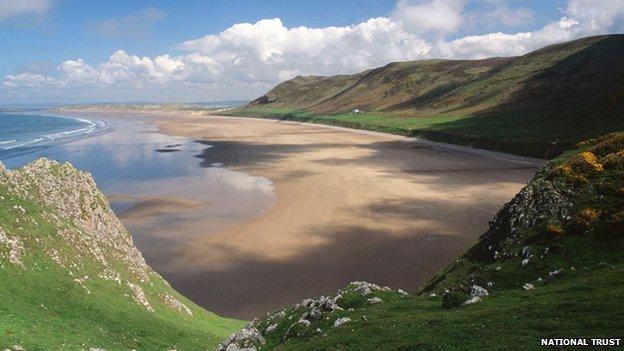Good Beach Guide: Wet summer blamed for poorer beach water
- Published

Rhossili Bay on the Gower peninsula was one of the beaches that was judged to have excellent water
The wettest summer in a century has been blamed for a big drop in the number of Welsh beaches rated as having excellent bathing water.
The Marine Conservation Society (MCS) Good Beach Guide found 98 of the 153 bathing beaches met the top standard, 23 fewer than the previous year.
Five beaches failed to meet a minimum European standard for water quality.
Pollution can be washed into the sea from agricultural run-off, poor plumbing, septic tanks and dog mess.
The MCS warned that sewage and animal waste is full of viruses and bacteria which can increase the chance of bathers catching an ear, nose or throat infection, or even gastroenteritis.
For 2011, the number of Welsh beaches with excellent bathing water rose by 20% to its highest number in 25 years with 121 out of 152 meeting the recommended standard.
However, the latest survey, external covering 2012 saw a huge drop in the quality of bathing water.
Three beaches have failed to reach even the minimum standards - Criccieth in Gwynedd, Ogmore Slip in the Vale of Glamorgan and Rhyl in Denbighshire.
They are in addition to two beaches - Llandudno west shore in Conwy and Pwllgwaelod in Pembrokeshire - which failed to meet standards in 2011 and 2012.
MCS spokesman Richard Harrington told Radio Wales: "The reason for all the beaches failing was certainly the weather.
"What does tend to happen is the the combined serial overflows - those storm drains that are used in emergencies - were used a lot during last summer and it may be that they are relied upon too much by water companies to deal with our sewerage.
"So further investment may be needed. It's certainly worth considering and worth looking at.
"Of those beaches that did fail, the majority of them were those that have serially been just above the legal minimum standards, so they haven't actually reached the excellent standards in previous years.
"I would say at those particular points some work definitely needs to be done. I would expect that there is a point source of pollution that's causing the problem that may be relatively inexpensive to fix. "
The MCS said a first Welsh bathing waters conference is be held later this year.
Sewage pollution
As well as in Wales, MCS has said fewer beaches reached excellent standards in every English region and in Scotland.
The Welsh government said the UK had experienced the wettest summer in 100 years in 2012.
"This record rainfall had a significant impact on our natural environment, including the water quality at some of Wales' top beaches and this is reflected in the water quality results for the 2012 bathing season," said a spokesperson.
"However 97 bathing waters in Wales did meet the mandatory standards in 2012, with 75 of those gaining the more stringent EC guideline standard."
The spokesperson said bathing water has "improved significantly" over the last 20 years, with almost 99% of the beaches meeting the bathing water directive standards in 2011, compared to only 78% in 1992.
"We will continue to work with the water industry, land owners and appropriate regulatory bodies to further improve water quality and protect public health," the spokesperson added.
The MCS Good Beach Guide is the only UK beach award which focuses entirely on water quality standards and the risk of sewage pollution.
The Blue Flag is a separate award, run by the Foundation for Environmental Education (FEE), which, along with measuring the the quality of bathing water, ensures that beaches are clean.
- Published21 February 2013
- Published3 May 2012
- Published2 May 2012